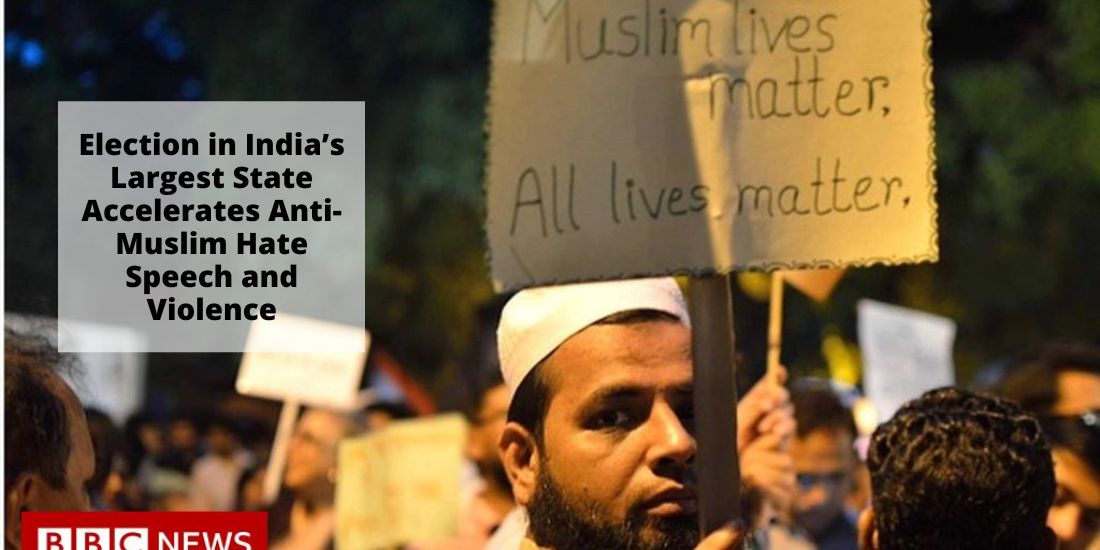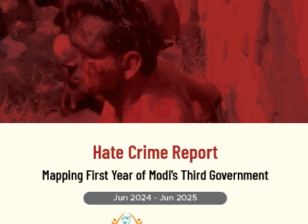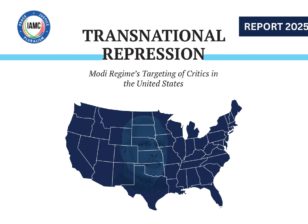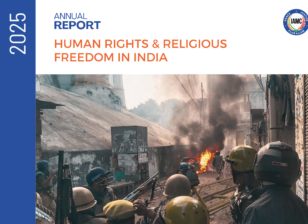Election in India’s Largest State Accelerates Anti-Muslim Hate Speech and Violence
Critical elections are proceeding in five states in India, including in its most populous state and political nerve center, Uttar Pradesh. The election there in particular illustrates the majoritarian nationalism that is driving widespread and lethal aggression against Muslims across the country. Amid the balloting that commenced on Feb. 10 and will end March 7, with results due to be announced March 10, Hindu nationalist leaders are energizing their constituents with calls for mass violence. Militant campaigns based on a conspiracy theory that Muslim men are marrying Hindu women to imperil and overpower Hindu culture – and a new law premised on that belief — stand to override the rights of Muslims and other minority communities. The elected head of state, Chief Minister Yogi Adityanath, is a Hindu nationalist demagogue from the ruling Bharatiya Janata Party (BJP) who is seeking a new term with a divisive electioneering strategy that pits minority groups against the majority.
Extremist Oath in Religious Convocation
On Dec. 22, 2021, a video that went viral showed the proceedings of a “Dharma Sansad,” (“religious parliament”) a specific kind of religious assembly, where attendees took a collective oath to turn India into a Hindu Rashtra (state), including by exterminating Muslims. At the gathering in Haridwar, located in the northern Indian state of Uttarakhand and considered a sacred place for Hindus, spiritual leaders and activists justified genocidal violence and the ethnocide of Muslims, provoking Hindus to “take up weapons to participate in this ‘cleaning campaign,’ just like in Myanmar.”
Around the same time as the Dharma Sansad in Haridwar, a vigilante youth organization, Hindu Yuva Vahini (meaning Hindu Youth Armed Force, or HYV), held an event in Delhi where participants endorsed violence –“fight, die, and if required, kill” – and vowed to galvanize a Hindu nation. HYV was founded by Yogi Adityanath. The organization describes itself as “a fierce cultural and social organization dedicated to Hindutva [the ideology of nationalist Hinduism] and nationalism.”
Prime Minister Narendra Modi, who heads India’s Hindu nationalist BJP government, did not denounce the expressions of hate in Haridwar. Neither did senior, influential leaders of his cabinet, such as Home Minister Amit Shah, whose ministry is charged with internal security. Instead, speaking at a Sikh Gurdwara on Dec. 25, Modi vilified India’s Islamic history. Referring to a revered Sikh religious figure, Modi declared, “Guru Tegh Bahadur’s sacrifice and his heroic acts against [Muslim ruler] Aurangzeb have taught us how the country should fight terrorism and religious extremism.” His message served as a dog whistle to Hindu nationalists to take up arms against a purported threat posed by Muslims to the supremacy of Hindus in India.
On Dec. 26, at another Dharma Sansad in Chhattisgarh, a conflict hotspot in central India where local social justice movements have been targeted by authorities and Hindu nationalists, a woman leader reportedly directed Hindu youth to assault Hindu women who have relationships with Muslim men. Uttar Pradesh has been the scene of similar events. On Jan. 30, a sansad there called for a Hindu Rashtra in India. Despite repeated instances, Adityanath has taken no steps to contain the hate mongering and incitement.
Yogi Adityanath
Adityanath has supported and directed various campaigns to override the rights of Muslims and other vulnerable communities. In a video that surfaced in 2014, Adityanath, whose original name appears to be Ajay Mohan Bisht, reportedly stated that: “If [Muslims] take one Hindu girl, we’ll take 100 Muslim girls. If they kill one Hindu, we’ll kill 100 Muslims.”
Adityanath’s ascendance to power and disdain for democracy have inflamed the militant wing of Hindu nationalists, and a number of Hindu right-wing activists have made deep inroads into the Uttar Pradesh state machinery. Adityanath has steadily elevated himself as Modi’s political successor and seems poised to forge a potential repeat of the historic massacre of Muslims by Hindu nationalists in Gujarat in 2002, while Modi was chief minister there. That assault helped catapult Modi to national standing among the Hindu Right.
Shortly after Adityanath came to power as chief minister in March 2017, local BJP leaders met with him. Thereafter, the Uttar Pradesh government began a process to withdraw 131 criminal cases against alleged perpetrators in Hindu-led mass violence against Muslims in the city of Muzaffarnagar in 2013 that led to 52 deaths and the displacement of more than 50,000 people. Individuals of Hindu descent were the accused in all of these cases. Between 2018 to August 2021, the Adityanath government approved the formal withdrawal of as many as 79 cases. They comprised about 14 percent of the 566 cases that had been filed. In 40 of 41 Muzaffarnagar cases, including in four gang-rape cases, the accused were acquitted.
The Uttar Pradesh government also has targeted elements of minority cultural and economic traditions. Using the provisions of the Uttar Pradesh Prevention of Cow Slaughter Act, 1955, one of the first orders implemented by the Adityanath government was to raid abattoirs and butcher shops, citing operational regulations, disproportionately targeting Muslim and Dalit livelihoods. In India, Dalit communities, historically identified by dominant groups and the caste system as “untouchable,” continue to be subject to heightened oppression. At the same time, during Adityanath’s rule, the Uttar Pradesh police have failed to apprehend Hindus participating in mobs that pursued and in some instances lynched Muslim men they accused of consuming beef and illegally trading in cattle. One of the accused stated: “The police are on our side because of the government.”
Police in Uttar Pradesh reportedly killed 146 people and injured more than 3,300 in encounters between March 2017, when the BJP government took office, and August 2021. As of August 2020, about 37 percent of the victims were Muslims. After the rape and murder of a young Dalit woman by four caste-privileged men in September 2020, Uttar Pradesh police and district administration reportedly hastily cremated the victim’s body.
In general, across India, the BJP poses as an ally to Hindus. It extols the 1992 demolition of the Babri Mosque in the city of Ayodhya by Hindu nationalists, continues the government’s militarized rule of and colonial posture towards Kashmir, promotes prejudicial citizenship laws, supports forcible conversions to Hinduism, corrupts the “reservation” system (akin to affirmative action for lower castes in education, employment, etc.), proscribes cattle slaughter, prohibits Muslim women’s right to wear the hijab, and scales-up the “love jihad” conspiracy theory.
“Love Jihad”
The notion of “love jihad” is a Hindu nationalist conspiracy theory that propagates bigotry to criminalize Muslim men and escalate Islamophobia. A concerted disinformation campaign, it racializes Muslims as violent and promotes loathing of the “Muslim Other.” It castigates Muslim males as hyper-sexual predators who aim to marry and convert Hindu women to Islam and change India’s Hindu-majority makeup. Based on chauvinist and heteronormative concepts, it portrays Hindu women as vulnerable and without agency (and as potential traitors), while seeking to efface their rights. It seeks to weaponize the identity of Hindu males as protector-aggressors and “saviors” of Hindu women who they claim are “abducted” into Islam in the guise of love.
On Nov. 24, 2020, the Adityanath-led government introduced and approved the Uttar Pradesh Prohibition of Unlawful Conversion of Religion Ordinance, 2020 (Vidhi Virudh Dharma Samparivartan Pratishedh Adyadesh, 2020). Colloquially referred to as the “love jihad” law, the anti-miscegenation and anti-conversion statute took effect four days later. In March 2021, it became a state law when the Uttar Pradesh governor signed an act adopted by the state assembly. The law is de facto security legislation that specifically targets minority religions, particularly Islam. It obstructs the rights of individuals, especially Muslim men and Hindu women, to enter into consensual interfaith relationships or to convert to Christianity or Islam.
The law has bolstered the longstanding “Ghar Vapsi” (return home) campaign to forcibly convert non-Hindus to Hinduism. Contrary to practice, the law is not exclusively applicable to non-Hindus or conversions out of Hinduism. Hindu nationalists mythologize all “Indians” to be originally Hindu. Rumored as “reconversion,” its effects are gendered and also impact other groups oppressed based on their caste or ethnicity, including Adivasis, Dalits, and LGBTIQA individuals.
While anti-conversion laws have existed in India since 1967, any alleged offender under the present-day “love jihad” law does not qualify for release with bail while awaiting trial. The current law invalidates marriages that are formalized with the “sole purpose of unlawful conversion or vice versa by the man of one religion with the woman of another religion.” Prison sentences range from 1 to 10 years. A person in an interfaith marriage attempting to change their religion must secure permission from a district magistrate. Further, groups presiding over en masse conversions may be fined as much as INR 50,000 (about $660), and persons conducting the conversion may incur a 3- to 10-year prison sentence. Non-consensual religious conversions are punishable by a fine of INR 15,000 (about $200) and 1 to 5 years in prison. Conversions involving minors, women, and those from “Scheduled Castes” or “Scheduled Tribes” may receive 2 to 10 years imprisonment and a fine of INR 25,000 (about $330).
Grievous Impact
In the course of my research, I spoke with a woman last year whose life is forever marred by the actions of Hindu nationalists seeking to avenge “love jihad.” (I am withholding her name and that of her former partner and certain details to protect their security.) She is of Hindu descent and met a Muslim man in a small town in Uttar Pradesh. The two fell in love and began to share a life affirmative of each other’s history and heritage. Friends and family worried for their safety, as their lives became increasingly circumscribed by the illiberal dictates of Hindu nationalists who policed such unions. As the threats mounted, otherwise benign differences among family and community were seized upon by the Hindu Right and became toxic. The Hindu community ultimately turned against their right to marry, and the pressure became overwhelming, as the events shattered his spirit and fractured her will to live.
In another case, Arbaz Mullah, a 24-year-old Muslim man who had fallen in love with a Hindu woman was murdered in the district of Belgavi in the southwest Indian state of Karnataka. His body was found Sept. 28, 2021, lying on railroad tracks, disfigured and decapitated. The same month, a mob attacked a 16-year-old boy from Uttar Pradesh on the suspicion of “love jihad” while he was traveling on a bus with a 12-year-old girl. Later, it was verified that both the girl and the male youth were from the Muslim community.
Hindu nationalist mobs also have attacked interfaith weddings in Uttar Pradesh or called police to break up the events, sometimes based merely on presumptions. Women have experienced violence, including in police custody. On one occasion, such an attack reportedly led to a miscarriage. Several hundred Muslim men have been physically attacked. Between Nov. 24, 2020, and Aug. 31, 2021, at least 189 people were arrested in Uttar Pradesh on charges of violating the “love jihad” law.
Under threat, numerous couples have retreated underground, as the law generates fear in everyday life. A Muslim woman said to me: “They [Hindu nationalists] accused my brother of deceiving and exploiting the [Hindu] woman he loved. They attacked him. We have known these people all our lives. Now they are patrolling our locality and watching us. My family is traumatized. Our sense of belonging is shattered, we have become pariahs in our hometown.”
Uttar Pradesh Elections and After
Uttar Pradesh is experiencing soaring economic and political troubles. The failure to deliver economic and social development of benefit to the whole population or to responsibly manage the COVID-19 crisis looms large. Yet, in 2020, the Adityanath government reportedly used only 10 percent of federal government funds it received for minority welfare programs.
The election outcome stands to affect Adityanath’s political destiny as well as the 2024 national elections — and with that, the BJP’s political future. Adityanath has declared that he believes the state’s Hindus, who make up approximately 80 percent of its population, will again deliver the state to the BJP this time. In the course of the campaign, Hindu nationalists are using hate speech to rally grassroots proponents and fence-sitters. Hostile messaging targeting Muslims proliferates in gossip and across political institutions and social media. In the face of the onslaught, minority communities and their allies are concerned about the impact of the results, regardless of the outcome. A BJP victory would place Muslims and other minorities at grave risk. At the same time, should a BJP victory fail to materialize in Uttar Pradesh, will Hindutva activists take out their fury on Muslims in the cause of absolutist Hindu nationalism?
This article first appeared in Just Security




